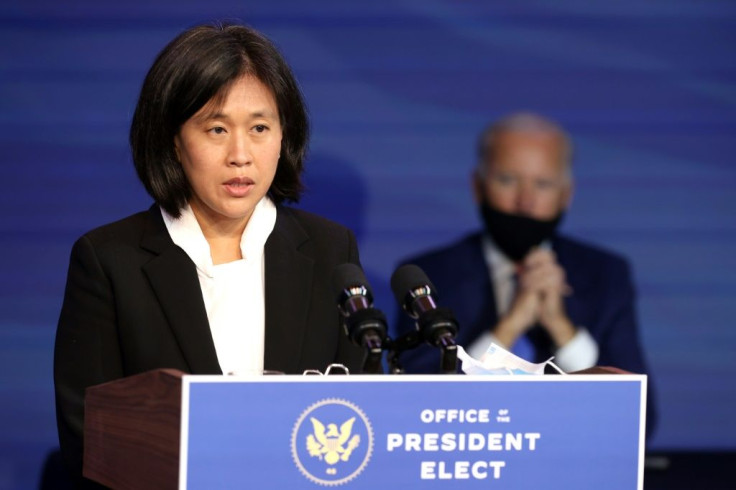Biden's Trade Chief Brings Long Experience On China
President-elect Joe Biden's pick to head US trade policy brings extensive experience in dealing with a key point of tension: China.
Attorney Katherine Tai, whom the president-elect announced this week would be his nominee as US Trade Representative (USTR), is also the rare political appointee who has the full-throated backing of business groups, politicians and labor leaders alike.
The decision puts an experienced trade lawyer on the frontline of repairing relations with US trading partners upended by President Donald Trump's aggressive "America first" policy, which included a damaging trade war with China.
"I've gotten more calls complimenting me on your appointment than you can imagine," he said at an event Friday unveiling his latest batch of cabinet members.
On taking over from Trump's USTR Robert Lighthizer, Tai would become the first Asian-American, the fourth woman and the first woman of color to serve in the cabinet-level role, continuing Biden's track record of promoting women and minorities to key positions.
Tai, a graduate of Yale and Harvard Law, was previously working as the chief trade lawyer for the House Ways and Means Committee -- indicating she is well versed in the challenges of getting legislation through a divided Congress.
She also spent seven years in the office of the USTR general counsel under former president Barack Obama, where she handled enforcement of cases filed against China with the World Trade Organization (WTO).
Tai speaks fluent Mandarin and was the first child born in the United States to parents who were born in mainland China.
Legislators of both parties, impressed by Tai's work in Congress on the USMCA free trade pact with Canada and Mexico negotiated under Trump, had recommended her for the post, according to US media reports.
"It's a testament to Katherine that everyone from business groups to progressive think tanks to the AFL-CIO are applauding her nomination," said Jake Colvin, vice president at the National Foreign Trade Council.
"Katherine is an inspired choice to lead USTR," he told AFP, echoing similar comments from other supporters.
Richard Trumka, head of the AFL-CIO labor federation, call Tai "a worker-champion."

Her selection "is a resounding victory for our families and communities."
Tai herself embraced that role, saying Friday she will be "an advocate for American workers."
Trade is "not an end in itself, it is a means to create more hope and opportunity for people," she said.
"I look forward to harnessing the power of our trade relationships to help communities lift themselves out of the current crisis."
But the Biden team faces a tough trade agenda, including deciding what to do about the raft of tariffs Trump imposed on Chinese goods, and what the next step will be in the relationship between the world's top economic powers.
Bill Reinsch of Center for Strategic and International Studies (CSIS) warns that support for Tai, especially among progressive Democrats, might wane amid the realities of negotiating trade agreements.
"No one gets 100 percent of what they want" in trade negotiations, he said.
"The question will be... is the perfect going to be the enemy of the good," or will they accept a partial victory and leave harder issues for later.
Jacob Parker, senior vice president of the US-China Business Council, stressed the Biden administration should ensure Beijing abides by its commitments under the "phase one" trade deal signed earlier this year.
He said there are areas, such as cloud computing, where progress is possible, but agreed with Reinsch that China is unlikely to give any ground on issues like industrial subsidies.
"We have to find a way to remove the tariffs that have been so damaging for industry," perhaps through a "phase two" deal, he told AFP, but added it would not be realistic for them to go away immediately.
In fact, Biden already said the tariffs will remain in place initially.
© Copyright AFP 2024. All rights reserved.





















